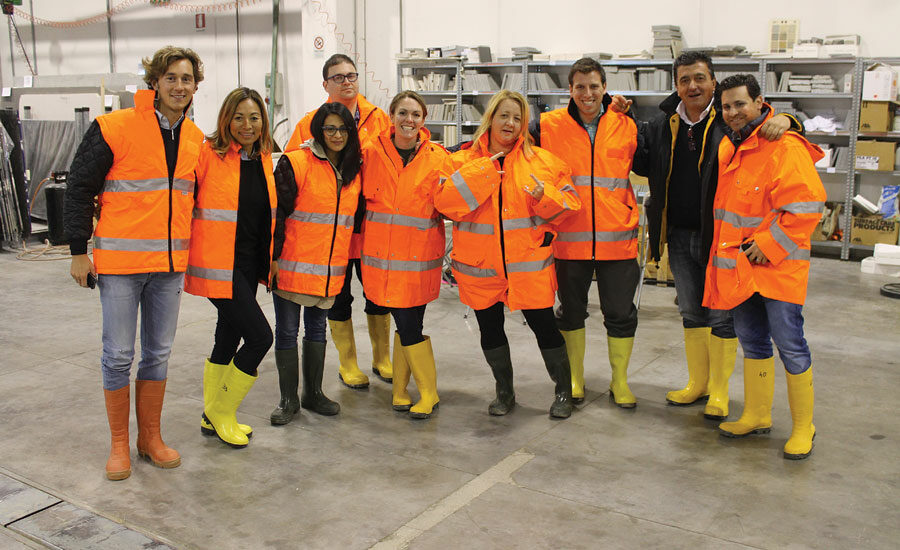Retailer Profile: Nemo Tile Captains Fresh Waters




Stephen Nichols helps educate customers on product knowledge and help them select the right product for their needs.








We recently caught up with Matt Karlin, third-generation president of Nemo Tile, as he prepped the company’s sixth retail location set to open in Red Bank, N.J., in late 2016. Founded in 1921, the company has grown through the ebbs and flows of many economic cycles. When Karlin joined the family business about a decade ago he set a goal to revitalize the brand, highlighting Nemo’s ability to service the architecture and design community on many high-profile jobs.
“We went about fixing the model of the business over the last 10 years,” he said. “We have moved to more of a branding approach than just being a tile store. The problem with stone and tile is it is very accessible. We have good competition in every segment of our business from commercial to retail to distribution.”
The awareness of the importance of branding may have come from Karlin’s experience at MTV network before following the path set out for him by his grandfather.
At first, the company struggled with defining the Nemo brand identity, said Kate Flanagan, Nemo Tile marketing director. Early on, Nemo Tile had a reputation for providing “essential” tiles, such as porcelain, ceramic and stone products in neutral colors and reasonable price points.
“We have moved to more of a branding approach than just being a tile store.”
“What used to be out there was that it’s a family-run business, a little antiquated and dated,” she said. “Matt’s vision is so forward thinking and moves so fast; it clashes with the perception that was out there.”
To help update its image and grow its market opportunity, the company began expanding its product offering with innovations that would appeal to the architecture and design community, such as Raffia, a textural porcelain tile that earned it top honors in the 2015 Interior Design Magazine Best of Year Awards. It also introduced Think Thin, a collection of natural stone panels cut at a delicate ½-inch thickness, making the products lighter weight and less expensive than traditional stone slabs.
The strategy has worked well for Nemo as it has grown its distribution capabilities and moved into the higher-end specifications market. Recent projects include Towers 2 and 4 of the new World Trade Center, Yankee Stadium and the Queens Midtown Tunnel in New York, as well Marlins Park in Miami and Starwood Mall in Columbus, Ohio.
The company adapted its showrooms to meet the client needs in each location while ensuring that everything is on brand across the board. No stranger to the retail segment — the company opened its first doors to the general public in Jamaica, N.Y., and still maintains showrooms in Manhattan (both commercial and retail), and Hicksville, N.Y. — recent years have seen Nemo Tile grow beyond its metropolitan roots through distribution and A&D work and a showroom in Philadelphia. Plans are also in the works to open a showroom in Boston and a New England distribution center to better service the northeast market by year’s end.
Despite all the positives, no one gets there without challenges. In an earlier foray into the Chicago market, Karlin learned better how to prepare for growth.
“It was a hard lesson,” he said. “Do not expand into a market where you do not have someone to expand with into that area. You need to bring in someone who knows the local A&D market and its people.”
Similarly, when Nemo first began making inroads into the stone market, it dealt with vendors that were unable to meet its strict specifications.
“Hiring really well, without thinking twice to bring in people that have experience in areas I don’t, was the best thing I’ve done.”
“We thought tile was tile and how it was ordered would be how it was received,” Karlin explained about the natural stone products. “What we bought was not what we received. Because of that we bettered our vendor relationships and hired stone people that help manage and monitor the purchases and selling of any stone we buy.”
Bringing in strong people to fill in the gaps in expertise is another factor in the company’s success. Flanagan said part of their marketing strategy is to select the right people to represent the company and the brand, and the company also developed an extensive onboarding process for all new hires.
“Hiring really well, without thinking twice to bring in people that have experience in areas I don’t, was the best thing I’ve done,” Karlin added.
Nemo distributes its tiles nationally to other retailers in addition to direct consumer and contract sales. As Karlin grows the firm into new territories, he also incorporates distribution centers into the plans to allow for growth in all its market segments. The Red Bank store opening promises a new set of opportunities and challenges for brand awareness.
“We’ve never been in New Jersey even though we are right next door in New York,” Flanagan said. “It will be a huge brand recognition issue as we go into Red Bank and no one knows us.”
She said the Red Bank team will need to become part of the community very quickly to build trust and also build awareness about the breadth and scope of Nemo Tile’s offerings.
“People think of us as so high end they don’t realize we have so many affordable options,” Flanagan explained. “We have the really high-end lines, but we also have so much to choose from at great price points.”
Looking for a reprint of this article?
From high-res PDFs to custom plaques, order your copy today!













